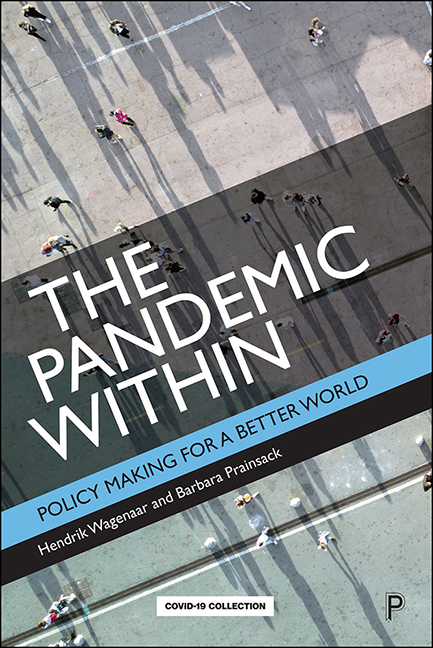Book contents
- Frontmatter
- Contents
- Acknowledgements
- 1 Introduction: The pandemic within
- 2 At home in the world: overcoming the predicament of complexity and hegemony
- 3 Ensuring a well-functioning public infrastructure
- 4 Housing is a public good, not a commodity
- 5 Redefining work and income
- 6 The return of good government
- 7 Real corporate responsibility
- 8 Money as a public good
- 9 Living in the Anthropocene
- 10 Towards an ecological society
- Notes
- References
- Index
1 - Introduction: The pandemic within
Published online by Cambridge University Press: 13 May 2022
- Frontmatter
- Contents
- Acknowledgements
- 1 Introduction: The pandemic within
- 2 At home in the world: overcoming the predicament of complexity and hegemony
- 3 Ensuring a well-functioning public infrastructure
- 4 Housing is a public good, not a commodity
- 5 Redefining work and income
- 6 The return of good government
- 7 Real corporate responsibility
- 8 Money as a public good
- 9 Living in the Anthropocene
- 10 Towards an ecological society
- Notes
- References
- Index
Summary
Occasionally, in the ongoing torrent of news and information that forms the background to our everyday lives, we are confronted with a story or image that, because it drives home the enormity of a particular situation, stops us in our tracks. The photo of 3-year-old Alan Kurdi, lying face down on the waterline of a Turkish beach, drowned on 2 September 2015, in an attempt to reach European shores, was such an image. It encapsulated the full horror of the Syrian refugee crisis that was unfolding in the Mediterranean. The image of that small lifeless body filled the viewer with emotions of pity and anger, a helpless feeling of being a bystander to a situation of vast moral complexity and unscrupulous political calculation.
Reading the first pages of Jessica Bruder's Nomadland. Surviving America in the Twenty-First Century(2017) prompted a similar visceral reaction in one of us (HW). In a virtuoso act of reporting, Bruder introduces a cast of characters whose lives she describes in the book. A former San Francisco cab driver, 67, who labours 12 hours a day, in sub-zero temperatures, at the annual sugar beet harvest in Minnesota. A 66-year-old former general contractor who walks 15 miles per shift in a vast Amazon warehouse in Campbellsville Kentucky. Or 64-yearold Linda May, standing in front of her tiny trailer, in the snow, in the campground where she makes 12 to 14 hour days as a camp host, receiving visitors, and cleaning toilets and camp sites. These women and men are itinerant workers who drive around the United States in search of work. Their cars, trailers or campervans are their homes. They have given up their ‘sticks and bricks’ house, and whatever dream they had of retiring, because they lost their job, business or 401(k) pension, and can no longer afford the monthly mortgage payments. Bruder reports how Amazon, ever pushing the frontier of corporate innovation, has created the ‘Camperforce’ programme to attract this itinerant population to augment its workforce during peak times, such as the months before Christmas. (This advance in human resource innovation has no doubt been facilitated by the opportunity to collect federal tax credits ranging from 25 and 40 per cent of wages, in return for hiring older workers; Bruder, 2017, 59.) They make long hours in dirty, mindless, backbreaking work.
- Type
- Chapter
- Information
- The Pandemic WithinPolicy Making for a Better World, pp. 1 - 8Publisher: Bristol University PressPrint publication year: 2021



